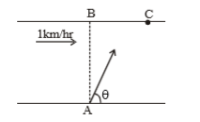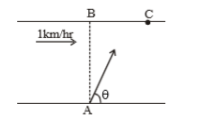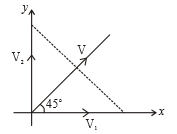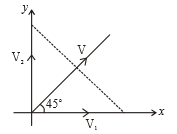For a particle in a non-uniform accelerated circular motion
| 1. | Velocity is radial and acceleration is transverse only |
| 2. | Velocity is transverse and acceleration is radial only |
| 3. | Velocity is radial and acceleration has both radial and transverse components |
| 4. | Velocity is transverse and acceleration has both radial and transverse components |
एक असमान रूप से त्वरित वृत्तीय गति में एक कण के लिए
| 1. | वेग त्रिज्य है और त्वरण केवल अनुप्रस्थ है |
| 2. | वेग अनुप्रस्थ है और त्वरण केवल त्रिज्य है |
| 3. | वेग त्रिज्य है और त्वरण में त्रिज्य और अनुप्रस्थ दोनों घटक होते हैं |
| 4. | वेग अनुप्रस्थ है और त्वरण में त्रिज्य और अनुप्रस्थ दोनों घटक होते हैं |
A river is flowing from W to E with a speed of 5 m/min. A man can swim in still water with a velocity 10 m/min. In which direction should the man swim so as to take the shortest possible path to go to the south.
| 1. | 30° with downstream |
| 2. | 60° with downstream |
| 3. | 120° with downstream |
| 4. | South |
5 m/min की चाल से एक नदी पश्चिम से पूर्व की ओर बह रही है। एक आदमी स्थिर जल में 10 m/min वेग के साथ तैर सकता है। आदमी को किस दिशा में तैरना चाहिए ताकि दक्षिण जाने के लिए सबसे छोटा पथ संभव हो सके।
| 1. | अनुप्रवाह के साथ 30° |
| 2. | अनुप्रवाह के साथ 60° |
| 3. | अनुप्रवाह के साथ 120° |
| 4. | दक्षिण |
In uniform circular motion
| 1. | Both the angular velocity and the angular momentum vary |
| 2. | The angular velocity varies but the angular momentum remains constant |
| 3. | Both the angular velocity and the angular momentum stay constant |
| 4. | The angular momentum varies but the angular velocity remains constant |
एकसमान वृत्तीय गति में
| 1. | कोणीय वेग और कोणीय संवेग दोनों परिवर्तित होते हैं |
| 2. | कोणीय वेग परिवर्तित होता है लेकिन कोणीय संवेग नियत रहता है |
| 3. | कोणीय वेग और कोणीय संवेग दोनों नियत रहते हैं |
| 4. | कोणीय संवेग परिवर्तित होता है लेकिन कोणीय वेग नियत रहता है |
A river is flowing with a speed of 1 km/hr. A swimmer wants to go to point 'C' starting from 'A'. He swims with a speed of 5 km/hr, at an angle with respect to the river. If AB=BC=400m. Then-

(1) time taken by the man is 12 min
(2) time taken by the man is 8 min
(3) the value of is 45
(4) the value of is 53
एक नदी की चाल से बह रही है। एक तैराक 'A' से प्रारंभ होकर बिंदु 'C' पर जाना चाहता है। वह नदी के सापेक्ष एक कोण पर की चाल से तैरता है। यदि तब-

(1) आदमी द्वारा लिया गया समय 12 मिनट है
(2) आदमी द्वारा लिया गया समय 8 मिनट है
(3) का मान 45 है
(4) मान 53 है
A particle moves so that its position vector is given by is a constant. Which of the following is true?
1. Velocity and acceleration both are parallel to r.
2. Velocity is perpendicular to r and acceleration is directed towards to origin.
3. Velocity is not perpendicular to r and acceleration is directed away from the origin.
4. Velocity and acceleration both are perpendicular to r.
एक कण गति करता है ताकि इसका स्थिति सदिश द्वारा दिया जाए जहाँ एक नियतांक है। निम्नलिखित में से कौन सा एक सत्य है?
1. वेग और त्वरण दोनों r के समांतर हैं।
2. वेग r के लंबवत है और त्वरण मूलबिंदु की ओर निर्देशित है।
3. वेग r के लंबवत नहीं है और त्वरण मूलबिंदु से दूर निर्देशित है।
4. वेग और त्वरण दोनों r के लंबवत हैं।
A car is moving in a circular horizontal track of radius 10 m with a constant speed of 10 m/sec. A plumb bob is suspended from the roof of the car by a light rigid rod of length 1.00 m. The angle made by the rod with vertical is -
(1) Zero
(2) 30°
(3) 45°
(4) 60°
एक कार 10 m त्रिज्या के एक क्षैतिज वृत्ताकार पथ में 10 m/sec की नियत चाल से गतिमान है। एक साहुल को कार की छत से 1.00 m लंबाई की हल्की दृढ़ छड़ से निलंबित किया गया है। ऊर्ध्व से छड़ द्वारा बनाया गया कोण है-
(1) शून्य
(2) 30°
(3) 45°
(4) 60°
A river is flowing from east to west at a speed of 5 m/min. A man on south bank of river, capable of swimming 10m/min in still water, wants to swim across the river in shortest time. He should swim
(1) Due north
(2) Due north-east
(3) Due north-east with double the speed of river
(4) None of these
5 m/min की चाल से एक नदी पूर्व से पश्चिम की ओर बह रही है। नदी के दक्षिणी किनारे पर एक व्यक्ति, जो स्थिर जल में 10m/min से तैरने में सक्षम है, कम से कम समय में नदी को पार करना चाहता है। उसे तैरना चाहिए-
(1) उत्तर की ओर
(2) उत्तर-पूर्व की ओर
(3) नदी की चाल से दोगुना उत्तर-पूर्व की ओर
(4) इनमें से कोई नहीं
A thief is running away on a straight road in a jeep moving with a speed of 9 m/s. A police man chases him on a motor cycle moving at a speed of 10 m/s. If the instantaneous separation of jeep from the motor cycle is 100 m, how long will it take for the policemen to catch the thief
(1) 1 second
(2) 19 second
(3) 90 second
(4) 100 second
की चाल से गतिमान एक जीप में एक चोर सीधी सड़क पर भाग रहा है। एक पुलिसकर्मी की चाल से गतिमान मोटरसाइकिल से उसका पीछा करता है। यदि मोटरसाइकिल से जीप का तात्कालिक पृथक्करण है, पुलिसकर्मी को चोर को पकड़ने में कितना समय लगेगा?
(1) 1 सेकेंड
(2) 19 सेकेंड
(3) 90 सेकेंड
(4) 100 सेकेंड
The angular speed of a fly wheel making 120 revolutions/minute is
(1)
(2)
(3)
(4)
एक गतिपालक चक्के की कोणीय चालजो कि 120 घूर्णन/मिनट से घूम रहा है, है-
(1)
(2)
(3)
(4)
Three particles moving with constant velocities and V respectively as given in the figure. After some time all three particles are in the same line, then relation among and V is

1.
2.
3.
4.
क्रमशः और V नियत वेग से गतिमान तीन कण जैसा कि चित्र में दिए गए हैं, कुछ समय बाद तीनों कण एक ही रेखा में होते हैं, तब V, में सम्बन्ध है-

1.
2.
3.
4.







